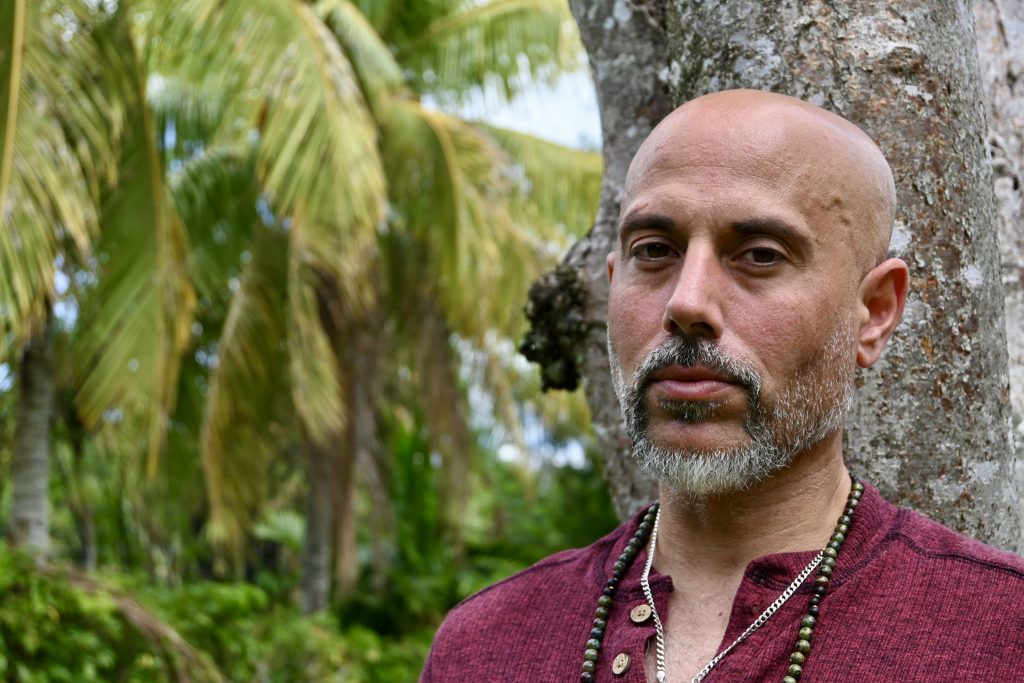By Theodore Richards, from the 2021 autumn/winter issue
I’m on the bus, in a crowd but somehow feeling lonely. We are heading north, along Lakeshore Drive, past Lake Michigan, its waves shimmering in the sunlight, waterfowl dancing along its edge. No one notices. Everyone is staring down at a device, existing in some other, personalized, curated, disembodied, individualized world. It’s a world in which each is simultaneously consumer and product. It is the world crafted by a system, a worldview, called capitalism. In this world, each of us is ultimately alone.
I. The Relevance of Spirituality Today
The question we all have is not so much about what happens to us after we die but whether or not we are alone in the Universe. If we are alone, no afterlife would be worth much; for me, even a blink of an eye with the possibility of true communion with others would be preferable to such an eternity.
The Great Reimagining: Spirituality in an Age of Apocalypse
How can we all be so connected and yet feel so alone? Is it possible that the promise of a global village through techno-capitalism was a lie—the Manichaean dream turned nightmare? I cannot help but think that there must be something more to re-discovering a connection than a phone, that this civilization is in need of some sort of spiritual re-awakening.
But is there a role for spiritual practice in the modern world? Are the old traditions even relevant? In an age in which are institutions are collapsing, in which radical political action is called for, isn’t it a little self-indulgent to focus on spiritual stuff? The answer is, well, maybe. It depends.
Most of what passes for spiritual practice today is what I will refer to as capitalist spirituality—spiritual practices that offer personal, individual salvation or happiness. And these practices are a little indulgent. It’s about stuff we can buy—modern indulgences—to enhance our individual lives. That’s because such spiritual approaches generally tend to be rooted in an individualistic worldview—that is, the worldview of capitalism.
But wait, you might object, aren’t these traditions rooted in ancient wisdom that predates capitalism? This is true. But that often has little to do with how a tradition is practiced in today’s world. For a spiritual tradition is always rooted in a deep and unspoken cosmology. And while we are now privy to a wider array of traditional spiritual practices than ever before, the way we approach them is profoundly limited by the constricted worldview of capitalism, a worldview that teaches us that we are fundamentally alone, responsible for our own successes and failures—our own salvation. It is no wonder that as more and more Americans practice yoga or mindfulness, we also consume more and more.
Spiritual practices, even if they originated in a cultural context that would offer a more interconnected and relational sense of self, often only reinforce the individualism of the capitalist worldview.
I am going to argue that the spirituality’s fundamental task at this moment in history is to offer an antidote to loneliness. To be clear, I am not talking about the loneliness that results from merely being alone too much or from not having enough friends. This is part of it—a consequence of a deeper and broader loneliness. A cosmic loneliness.
To begin, the problem of loneliness is a delusion, albeit a powerful one. To understand how we get there, we must understand how human beings create our sense of self, community, and world. This is called a cosmology or worldview. And it is expressed in every culture through symbol and story. For millennia, human cultures around the world created myriad unique worlds through the stories they told. In each case, the human was understood as a part of a community, and a part of a broader ecological web.
But in the Modern world, a new story emerged. The human was considered to be primarily an individual, acting out of self-interest. Great divisions were made between the saved and the damned. Colonialism, The Protestant Reformation, and the rise of capitalism all contributed to these views. What’s been lost in all this is the fundamental purpose of spiritual practice—to cultivate and embody a story that allows for us to find our place in relationship to one another, to the cosmos.
II: From Crises to Crisis
“Totalitarian movements are mass organizations of atomized, isolated individuals.”
Hannah Arendt, The Origins of Totalitarianism
It is impossible to avoid the immensity of the climate crisis. Because its scope is global, and its threat is existential, it feels like the climate crisis is the greatest challenge humanity has ever faced.
At the same time, our species seems to be threatened by myriad crises: fascism is spreading from The United States to Europe to India to South America; economic disparities are increasing; geopolitical instability has led to migrant crises at the southern borders of both North America and Europe. I could go on.
But it would be a mistake to look at all these events as separate and disconnected. Our economic system, capitalism, requires constant, infinite growth. Constant, infinite growth on a planet with limited resources is leading to both economic inequality and to the climate crisis. No new technology can save us if we cannot deal with our consumption addiction. The migrant crisis is also a problem of climate. Across the globe, from Central America to the Sahel to the Middle East to India, there is a band of nations dealing with depleting resources, shrinking water supplies, and geopolitical instability. In many ways, these are climate refugees.
And all of this instability has led to the proliferation of fascist movements across the globe.
While it may seem like these are all different crises—indeed, there are times when the political discourse would suggest that the concerns of, say, the environment are at odds with justice for oppressed peoples—by taking a step back we can see that we are actually seeing a single, global crisis.
A crisis of story.
How was it possible for me to feel alone on that bus, in a crowd of people, next to a huge body of water teaming with life? It has little to do, obviously, with proximity to other people, or even access to nature. It’s all about the story we are telling about who we are. For a cosmology, a worldview, is brought to life not by information about our world, but by a story we tell. And the story of our civilization is the story of individualism and separation. This is because capitalism requires us to believe that we are fundamentally alone, acting merely as individuals rather than as members of a community. How else could the system of global slavery been enacted but with a story that described some groups as less than human? How else could we destroy the biosphere but with a story that tells us we are separate from nature?
And if we don’t feel alone, we won’t keep buying what they are selling.
III: The Inner Climate
Whoever you are, no matter how lonely,
the world offers itself to your imagination,
calls to you like the wild geese, harsh and exciting —
over and over announcing your place
in the family of things.Mary Oliver, “The Wild Geese”
Our world isn’t merely interconnected from crisis to crisis. The inner and the outer are also inextricably linked. Among the most pervasive—and problematic—of the myths that capitalism produces is the notion that our inner lives are somehow separate from the social and political factors that shape our world.
But that feeling of loneliness, our interior ecology, is not separate from the external conditions. The story that separates us from one another leads not only to climate crisis and fascism, it also has led to an epidemic of loneliness. The mass shooter proliferates in the age of mass extinction and mass incarceration. The opioid addict and the pill popping soccer mom are both looking for the same thing—a sense of place in the world.
If our worldview is made up of stories, then the collapse of those stories is experienced as the end of the world—an apocalypse. This is what was happening among the Israelite people when the apocalyptic tradition came about. Confronted with the global military power of Rome and economic pressures that upended their traditional ways of life, the Israelites saw their culture unraveling. The Hellenistic culture of the eastern Roman Empire was replacing the traditional Israelite worldview.
The genius of the apocalyptic tradition wasn’t in any predictions of the end of the world; it was the visions of what my lie on the other side, when a new story a new worldview emerges. Indeed, apocalypse means “unveiling.” This was the vision of Jesus in the gospels, the “Kingdom” of a world in which the old values no longer applied.
Our situation today is no less apocalyptic, perhaps more so, than in Jesus’ time. This isn’t just about climate change. The individualism of the capitalist worldview has reached its nadir—absolute, cosmic loneliness. This is the loneliness of the mass shooter and the fascist who want to destroy a world that no longer feels like home, the loneliness of the addict and the corporate CEO who want to consume a world to replace a lost sense of self.
But it is important to note that this worldview—which, like all worldviews, feels so natural that it’s just common sense—is an anomaly in human history. If modern home sapiens have been around for about 200,000 years, the modern capitalist worldview has only been a mere blip. For most of our history, human beings have created stories of belonging and relationship. This is how we survived. It isn’t merely our big brains—indeed, those can build bombs that destroy us all. It’s our ability to create community and belonging through symbol and story that allowed us to thrive. The human, without the sharp teeth of the lion or the speed of the gazelle, needed cooperation to survive.
And so, the old stories, and all the spiritual practices brought forth through them, were fundamentally narratives of belonging and relationship. When our ancestors drew pictures of the animals they hunted on the walls of the cave, they understood that this was their kin.
Later, complex philosophical systems arose to reinforce the relationships upon which we all depend. Throughout Africa, for example, individual personhood is understood to have meaning only in the context of other people. This concept, known as ubuntu, is the foundation of African spiritual and philosophical thought.
In Buddhism, the individual self is considered to be “empty”. The Vedic notion of the higher self or atman was replaced by the concept of anatman—literally “no self.” This doesn’t mean we don’t exist; rather, it means that we are fundamentally relational. We give rise to one another; we depend on one another. When I try to locate my true identity in the absence of others, I find nothing. I am, in fact, the relationships I have cultivated, the air I breathe, the food I eat, the ideas I share.
Imagine how different our world could be if we lived in these terms?
A spiritual life rooted in concepts like ubuntu or anatman isn’t about individual salvation or happiness. It is about a story that connects us.
To imagine that we are part of a global community requires deep spiritual work. It has to be about worldview and story. And while the old traditions can inform us, we also need to do the work to reimagine them in ways that make sense for this unique moment.
It needn’t be too complicated. Let’s return to the bus. The practice is to be there, present, and to perceive and to feel our interconnectedness. We are in relationship with the other people there. We are in relationship to the birds soaring over the water. We are in relationship with the water itself. We’ll soon be drinking it. Soon, our own bodies will return the water back to the lake.
Theodore Richards (www.theodorerichards.com) is the founder of The Chicago Wisdom Project (www.chicagowisdomproject.org) and the author of seven books and numerous literary awards, including three Independent Book Awards and two Nautilus Book Awards. His most recent book is A Letter to My Daughters: Remembering the Lost Dimension & the Texture of Life, winner of the Independent Publisher Awards Gold Medal in memoir. He lives on the south side of Chicago with his wife and three daughters.


